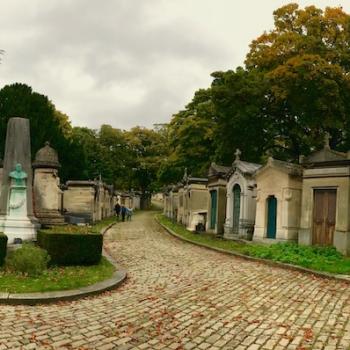This letter to the church in Corinth wasn't providing a sentimental reading for their weddings, it was a smack down. They were bickering and dysfunctional and competitive. Some of them had some mad skills but were being asses about it, as though being church together had become sort of a competitive sport. They were being petty and prideful and ridiculous. They didn't know who they were, and Paul was trying to remind them.
And he told them who they were not by telling them about history or biology or sociology, but by telling them about love. Not the emotion of Love. Not the sentiment of Love. Not the romance of Love. Because honestly, I have yet to see a Hallmark card with I love you so much that I will endure you. Or, My love for you bears all your things. But Paul writes of Love as origin. Love as source. Love as God, and God as Love. This Love has really nothing to do with feeling nice. It's actually not about feelings at all, it's about truth. It's about the truth of who we are through the eyes of a God who knows us fully.
This love described by Paul isn't mushy and sentimental. It's tough and unwilling to yield. This love -- which is patient and kind and isn't rude or boastful and is self-giving and all that -- here's what is scary about this kind of love: you can't manipulate it. There is no amount of weight loss, piety, personality management, big smiles, or strained pretense that can effect this love. And maybe in the absence of manipulation we stand bare before the eyes of God. This love is found in the gaze of God as God looks upon us naked and whole. Because this type of love is characterized by the giver not the receiver. Gone are the strivings and manipulations and efforts to make ourselves more lovable. In the face-to-face Gaze of the beloved we are known because we are loved. We aren't loved because we are known -- that leads again to trying to gussy ourselves up to be lovable.
We are known by God because we are loved by God. Think about that. The truth of who we were before any pain and hurt was transmitted to us by those who are hurt and in pain...before we forgot our song... we were loved. Paul says, "For now we see in a mirror, dimly, but then we will see face to face." For now we manipulate our selves and our image and our loved ones and see only dimly. Now we gaze in the mirror and see only part of who we are and even then the image is reversed. But we have the promise that in the fullness of time we will see face to face with God. Because, Paul writes, "Now I know only in part; then I will know fully, even as I have been fully known."
The truth of who you are is found in the eyes of God, not the eyes of the world. It is the love of God who created this world and called it Good. It is the love of a God who brought the Israelites out of slavery, who fed Ruth and Naomi, who walked among us as Jesus of Nazareth, it is the love of the God who knit you together in your mother's womb that gets to tell you who you are. Nothing else. Not the media, not a family who wishes you were different, and not even yourself. Only the God who knows and loves you fully can tell you who you are. And this is true of everyone, the good the bad and the boring.
In the movie Dead Man Walking, Sister Helen Prejean offered pastoral care to a despicable murderer. He was an unrepentant, wretched man. Yet her faith in a loving God allowed her, moments before his execution, to say to him, "I want the last face you see in this world to be the face of love, so you look at me when they do this thing. I'll be the face of love for you."
I think Paul might be telling us to be the face of love for each other. When we know that we are loved by God in the fullness of God's knowledge of us we are free to live in this love. Free to transmit the love of Christ in a hurting world. Free to see ourselves and others as God sees us. Not because we are good, but because we are loved. And seeing just a glimpse, wanting it, moving toward it, brings us closer to what is promised to us forever: that we will see God, who is love, face to face.
Amen.
Nadia Bolz-Weber is a Lutheran pastor living in Denver, Colorado, where she serves the emerging church, House for all Sinners and Saints. She blogs at Sarcastic Lutheran and is the author of Salvation on the Small Screen? 24 Hours of Christian Television. Her sermon is reprinted with permission from her blog.
Read these other articles by Nadia Bolz-Weber at Patheos:




